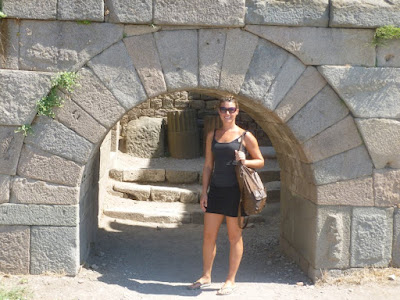As part of the CIG team, along with Jonathan, David, and the interns – Sarah, Tessa, and Christina, I have been able to take an active role in Canadian archaeological endeavours in Greece. My first involvement with CIG and Canadian archaeology was as an undergraduate in 2005 through participation on the Institute’s Kastro Kallithea project in Thessaly, a joint collaboration between the University of Alberta and the 15th Ephorate in Larissa. I have continued to be part of the Kallithea team and am proud to participate and support Canadian archaeological projects. As a M.A. student, I expanded my involvement in Canadian archaeology in Greece as a Brock University intern at CIG in 2010. My internship only heightened my interest in the field and my desire to maintain participation in Greek-Canadian archaeology as I began a Ph.D. at the University at Buffalo, SUNY in 2011. Consequently, when the opportunity arose to apply for a fellowship at CIG, I applied in anticipation of being part of the team once again and promoting Canadian students and scholars in Greece. Four years later, Jonathan and David still exhibit the same enthusiasm and desire to maintain and to advance the Institute’s interests within Greece and back in Canada.
Unlike my three-month internship, however, a nine-month fellowship offered many more opportunities to become acquainted with the scholars who pass through the Institute; although I am familiar with much of their scholarship, I have not had the chance to meet them all. Tristan Carter’s keynote address about the Stelida Naxos Archaeological Project at the Open Meeting really stood out for me, because of his passion, research questions, and methodology. I believe that it is scholars such as Prof. Carter who are crucial to ensuring the future of Classical Studies and Archaeology, by inspiring a new generation of young scholars to enter the field and pursue dynamic new venues of research.In addition to networking with Canadian and International scholars, as the fellow at the Canadian Institute I have broadened my understanding of past and present Canadian involvement in Greece. During the fall, I catalogued the Fred Winter archives and developed the Portal to the Past, while, in the spring, I focussed my efforts on consolidating and recording the Institute’s fieldwork archives. By sifting through these documents, I learned about the Institute’s work and gained an in depth understanding of the bureaucratic process of permit applications and archaeological research. Since its inception, the Canadian Institute has been granted permits for many fantastic and diverse archaeological projects throughout Greece, amongst which are the Persian Wars Shipwreck Survey, the Mytilene Project, the Tanagra Survey Project, and the Kamares Cave Project on Crete. Although the fieldwork archives were not always easy to wade through, I truly enjoyed reading the documents and certainly learned a great deal about Canadian archaeological research in Greece and the importance of CIG in fulfilling these endeavours.Although I am sad to say goodbye to the Institute, I will only be moving across the street to the American School of Classical Studies as the 2015-16 Jacob Hirsch Fellow, so I will be able to stay in touch. I am grateful for the opportunity to be part of CIG and will always think fondly of my time here. Thanks to all of you who made this such a memorable year for me!
Lana Radloff







No comments:
Post a Comment